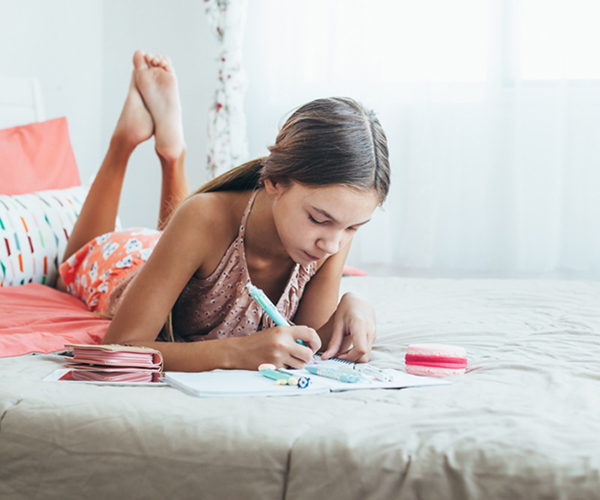
“I have seen self-harming in children as young as prep, grade one and two.” This quote from a Victorian Primary School principal in The Age newspaper feature entitled ‘Fear for prep kids driven to self-harm’. Hard to believe isn’t it? That children so young could take to harming themselves in an attempt to cope with their psychological suffering. Read the article here
In the same article, President of the Victorian Principals Association Anne-Marie Kilman spoke of children as young as grade two telling her they wanted to die. I cannot imagine what these kids and their families are going through.
These children, who are at one end of the anxiety continuum, are in desperate need of professional help.
And its cases like these that highlight the crucial role parents and teachers can play in recognising anxiety and supporting anxious kids. Anxious kids can live wonderful lives. No doubt about it. Anxiety isn’t a diagnosis that needs to send parents reeling and fearing the worst. With early recognition, empathy, an understanding of their condition, plus skills and strategies to manage their anxiety, anxious kids can turn the dial down on their anxiety and live life in full colour.
Like anything else in life, the more informed we are about anxiety, the calmer and more empowered we’ll feel, enabling us to support and advise our precious kids through their challenges and seek help when needed. If you suspect your child is anxious, make an appointment with your family GP and open up the conversation.
Anxiety, what is it anyway?
Anxiety is a completely normal reaction under dangerous or stressful circumstances. Perhaps you’ve narrowly avoided a car accident, your heart is pounding, your breathing becomes shallow and fast and your body floods with adrenaline, all preparing you to face-up to the ‘threat’ or quickly flee. This is the fight or flight response in action.
It’s a normal response to a threatening situation. All of these physical changes happen instinctively as part of our brain called the amygdala tells the sympathetic nervous system to take over and fire us up so we can do what we have to in order to survive.
For those of us with an anxiety disorder, the amygdala is hypersensitive to threat, the body and brain remaining on high alert long after the threat has passed (whether the threat is real or imagined). It’s common, it’s treatable and there’s so much we can do to help as parents. Here are 6 critical skills anxious kids need to learn:
Critical skills for anxious kids
1. Understanding anxiety
Teach your child about anxiety so he/she knows what underlies the thoughts and feelings. Knowing what they’re experiencing has a name, is well understood and is treatable brings anxious kids so much relief.
2. Checking In
Checking in is a skill that enables anxious kids to get a bearing on their emotions. Once learned, anxious kids can use this knowledge of what’s happening inside their skin to make decisions about how to manage their emotions. If a child identifies they’re feeling worried, or fearful, this opens the door for a conversation with mum or dad and gets them the support they need to put helpful skills and strategies into place for managing their anxiety when it shows up.
3. Breathing
Because breathing becomes shallow and fast with anxiety, a simple yet incredibly effective way to show the amygdala that everything is ok is to practice deep intentional breathing. This is the only scientifically proven way to consciously begin to calm the nervous system. Intentional breathing is a salve for an anxious mind and body. Belly breathing, box breathing and breathing games like blowing on an imaginary hot chocolate are exercises to try. Once kids find the one(s) they like, encourage them to practice often. Using breathing skills to help manage an anxious moment is effective when children have regularly practised these exercises while calm and content.
4. Mindfulness
Mindfulness is a superpower for the anxious brain (any brain in fact!). Anxious kids can worry a lot, their minds fast-forwarding to a future event or ruminating on events of the past. Mindfulness brings their attention to the here and now, a place where they’re loved, safe and will find more peace and contentment. Apps like Smiling Mind and Headspace are wonderful for kids learning to purposefully pay attention to what’s happening in the moment.
5. Defusion
It’s natural to tell kids ‘don’t worry about it’ or ‘it’ll be okay’ when they share their worries with us. We know their worries can be irrational and far-fetched, but saying don’t worry about it assumes that they can actually control what they’re thinking. Which they can’t. None of us can. Not really. Instead, ask them a question. Ask “is it helpful?” Instead of asking them to find evidence for or against their worry, this is a brilliant question to ask a worrier. The answer is almost always no, in which case the next step is to do something. Anything that engages them in an activity that’s important to them. It could be practising an instrument, playing with a sibling, bouncing on the trampoline, listening to music or drawing. It doesn’t matter what. It’s about taking action. When the worries comes back – as they will – ask the question again. Soon enough, “is it helpful?” will be a question they can ask themselves and then get back to whatever it is they were doing in the first place.
6. Understanding the importance of exercise
Anxious kids feel like a racing car that’s stuck in the pits. All revved up and nowhere to go. Anxiety brings with it a rush of stress hormones like cortisol and adrenaline to power up the body to fight or flee danger. But of course with no actual danger present, the body undergoes all these changes and needs to actually do something in place of fighting or fleeing. Getting anxious kids moving is the key here. Exercise like running, skipping, trampolining, shooting hoops or kicking the footy will help them feel better physically and will help shift their mood. Help your anxious child make the link between exercise and feeling better as often as possible. Remember, you’re teaching lifestyle skills here too.
Your anxious child is incredibly lucky to have you looking out for them, learning about anxiety and how you can support them to manage theirs. I’m incredibly proud to have co-written Anxious Kids: How children can turn their anxiety into resilience (available here) to equip you with the knowledge, understanding and strategies to help you support your anxious child to thrive. It’s the book I wish my parents had when I was a kid. That said, my journey with anxiety has led me here and to you, and for that I’ll always be grateful.

share the love
[Sassy_Social_Share]

about
Jodi is on a mission to elevate mental health and wellbeing in families, classrooms and workplaces.


free 5-day
Calm your anxious brain
mini course

Recent Posts

free 5-day
Calm your anxious brain
mini course
Sign up for my free 5-day ‘Calm Your Anxious Brain’ email mini-course. Put the strategies into place for yourself, light the way for your kids, or do both.






